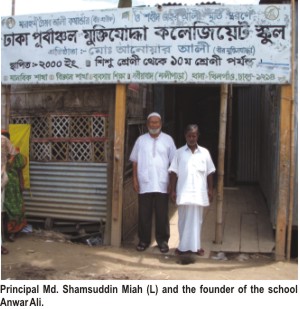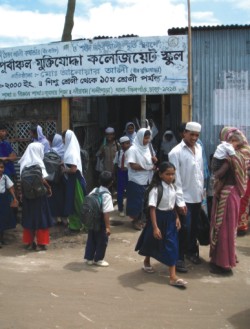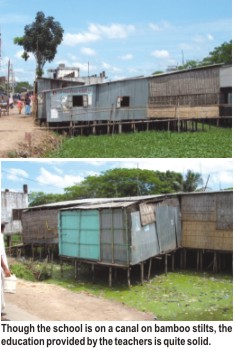|
Endeavour
A Freedom Fighter's Dream

Imran H. Khan There is a fine line between dream and reality and one man has carefully managed to merge these two. This is the story of a muktijoddha (Freedom Fighter) who had lost it all: brothers and friends killed in 1971 and a son. Anawar Ali, a simple, uneducated man of Nandipara, had a dream of opening a school for the generations to come. His dream is now a reality. Commemorated to the memory of late Commander Toiab Ali, Bir Protik and Shahid Johar Ali, the school started classes in 2000. Without the financial backing of the government, politicians or businessmen, he single-handedly built the entire school starting from the very pillars made from just bamboo sticks.
 This mélange of bamboo, tin and wood with no solid flooring, is located on top of a canal in Nobiabad (Nandipara), Dhaka, and has the impressive name Purbanchal Muktijoddha Collegiate School. The classrooms are all furnished with benches, tables and blackboards. As one makes one's way from one classroom to another, the green, slimy water below shimmers in the morning sunlight through the cracks in the floor-works. The only form of partition is a wall of bamboo bera (woven bamboo segments) but that does not stop the children from coming to this school. One look at their faces and you can easily see that there is hope and ambition in their eyes -- hope for a different future. This mélange of bamboo, tin and wood with no solid flooring, is located on top of a canal in Nobiabad (Nandipara), Dhaka, and has the impressive name Purbanchal Muktijoddha Collegiate School. The classrooms are all furnished with benches, tables and blackboards. As one makes one's way from one classroom to another, the green, slimy water below shimmers in the morning sunlight through the cracks in the floor-works. The only form of partition is a wall of bamboo bera (woven bamboo segments) but that does not stop the children from coming to this school. One look at their faces and you can easily see that there is hope and ambition in their eyes -- hope for a different future.
Ali is a small time businessman and whatever he can save, he puts it into this school. He is basically the mother and the father of this school, says Md. Wahed Ali, his brother, also a freedom fighter.
It is difficult to grasp the vastness of the premises until you are actually inside. Boasting close to 580 pupils and with a daily attendance of at least 550 students, the school stays open from 8 am to 12:30 pm. The pupils are mostly local children but there are others who walk a long way in the early hours of the morning to get to this institution.
"The school has classes from nursery, or as we like to say it the 'baby section', to class 10. There are 11 class rooms in all, the largest having the capacity to hold 70 children," says Principal Md. Shamsuddin Miah who is in charge of the school. "The minimum capacity of a classroom is 30 children." Each class period is 35 minutes long, which leaves room to instruct eight different subjects everyday. The fees for classes 9 and 10 are Tk.70 per month, while the fee for the baby section is Tk.45 per month. The rates for the other classes fall within this bracket. "The fees are lower than in most schools in the surrounding area," states Miah.
 The school is currently not recognised by the government though this is the only school in the memory of Freedom Fighters, set up by a freedom fighter -- ironically, one who never went to school. "In class 9, the registration process is such that the pupils can enroll into some other school, one that is recognised by the government," says Miah. From there, they can take their S.S.C. examination; one batch has already taken their S.S.C. examination and the pass rate was quite good," says the proud principal. In higher classes, the children are taken to other schools to look at scientific apparatus to get some minimum knowledge about them when it comes to subjects such as physics, chemistry and biology. Both commerce and science subjects are taught at this school and most of the teachers have degrees in M. Com., B. Com. and M. Sc. There are 16 teachers in all, six male and 10 female. The highest salary is Tk.1,200 and the minimum Tk.600 per month The school is currently not recognised by the government though this is the only school in the memory of Freedom Fighters, set up by a freedom fighter -- ironically, one who never went to school. "In class 9, the registration process is such that the pupils can enroll into some other school, one that is recognised by the government," says Miah. From there, they can take their S.S.C. examination; one batch has already taken their S.S.C. examination and the pass rate was quite good," says the proud principal. In higher classes, the children are taken to other schools to look at scientific apparatus to get some minimum knowledge about them when it comes to subjects such as physics, chemistry and biology. Both commerce and science subjects are taught at this school and most of the teachers have degrees in M. Com., B. Com. and M. Sc. There are 16 teachers in all, six male and 10 female. The highest salary is Tk.1,200 and the minimum Tk.600 per month
"We also have some very poor children who pay lower than the average fees." There are also 10 children of freedom fighters who are studying here free of cost. "It is the least we can do for them compared to what their fathers did for this country," asserts Miah.
Alongside education, the school provides recreational facilities for its students. Though they do not have a field of their own, the children are allowed to play in an adjoining local field and an annual sports event is held each year. The school has its own volleyball team and a volleyball coach who is an ex-national player. Students of this school have won accolades, which include a runner-up prize in the local inter-school volleyball championships.
 Twice a week, the school gets medical aid from a local NGO. They give first aid and vaccination to the children and to people who come to them at the school premises. Twice a week, the school gets medical aid from a local NGO. They give first aid and vaccination to the children and to people who come to them at the school premises.
“In '71, the area was under water which flowed to the Buriganga. We used to go by boat from house to house in this very place," remembers Sadeq Ahmed, another freedom fighter and a cousin of Anawar Ali. "The situation of the country is not what it was supposed to be," he adds sadly. His distant expression gives the sad impression that, unlike the school which emerged from the water, the country which was supposed to emerge after the war was not the one they had hoped for.
"A large battle was fought in this area on December 13, 1971. We captured a Pakistani gunboat with arms and many died on both sides. The Pakistani attackers had to leave the bodies of 13 SSG Commandos behind, as they had no room left to carry more bodies," Salah Mohammad, another brother recalls. He continues his reminiscing, "There was a Ghati here and camps all round this area. There are simply too many memories to share."
There have been protests from environmentalists because of the blockage of the canal and the government has decided to make the canal functional.
 Ali was told, verbally, to evacuate the current premises. "The government has broken all of the illegal structures that came up around the school. We fought hard to keep the school and requested an extension of the deadline," says Ali, desperate to save his dream from drowning. "We have till December of this year to relocate our school, but where do we move to?" Ali was told, verbally, to evacuate the current premises. "The government has broken all of the illegal structures that came up around the school. We fought hard to keep the school and requested an extension of the deadline," says Ali, desperate to save his dream from drowning. "We have till December of this year to relocate our school, but where do we move to?"
"We are four brothers -- Md. Wahed Ali, Salah Mohammad, Sadeq Ahmed and Anwar Ali, and we are all freedom fighters. How can one brother stay at home while another is in the field of battle? We were amongst the 664 fighters who got the Bir Protik award," says Wahed Ali.
 We are slowly losing our freedom fighters to time and their names and stories, a part of our history, are being lost to the coming generations. As long as this school stands, it will be a memory to these brave souls and we will have upheld, even if only in a small way, the honour of our muktijoddhas. We are slowly losing our freedom fighters to time and their names and stories, a part of our history, are being lost to the coming generations. As long as this school stands, it will be a memory to these brave souls and we will have upheld, even if only in a small way, the honour of our muktijoddhas.
Obviously the school is in dire need of financial support from philanthropic members of our society. This is the only way Purbanchal Muktijuddha Collegiate School can be saved, and, through ensuring this, in a small way, the patriots who gave up their lives for the liberation of this country, will live on.
Copyright
(R) thedailystar.net 2005 |
